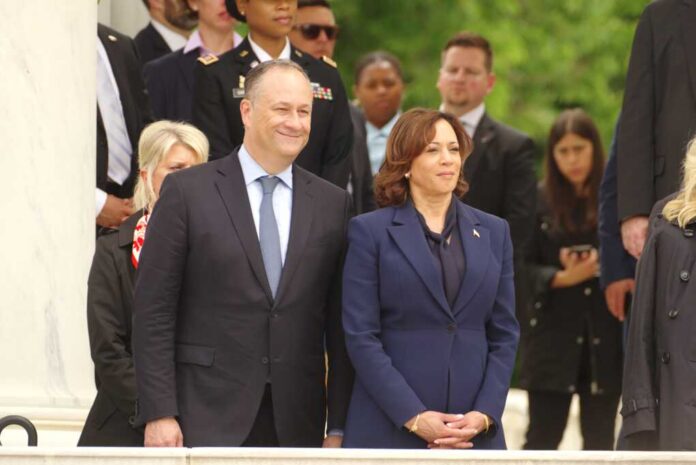Kamala Harris – 2026 Run REVEALED?

Doug Emhoff’s substantial income from Willkie Farr & Gallagher raises questions about ethical considerations amidst political ambitions and controversial business dealings.
At a Glance
- Doug Emhoff, Kamala Harris’s husband, earns around $6 million annually as a partner at Willkie Farr & Gallagher.
- The law firm struck a controversial deal with the Trump administration involving diversity program concessions.
- Emhoff reportedly disapproved of the firm’s alignment with Trump policies.
- Speculation arises about Harris’s political and financial intentions, including a possible gubernatorial run in 2026.
Income and Ethical Concerns
Doug Emhoff, the husband of Vice President Kamala Harris, currently faces scrutiny due to his role at the prominent law firm Willkie Farr & Gallagher. As a partner, Emhoff enjoys an impressive income reported at around $6 million annually. However, the ethical implications of this association have sparked considerable discussion. The law firm’s controversial decision to end support for diversity programs has juxtaposed Emhoff’s public stance against their alignment with the Trump administration.
Despite this disagreement, Emhoff has not resigned from the firm. His continued presence has fostered speculation on the motivations behind this decision. Critics suggest that financial gains and Emhoff’s potential political aspirations could outweigh his principles. This tension reflects broader concerns about the interplay between personal interests and public integrity, particularly in light of Kamala Harris’s rumored consideration of a 2026 gubernatorial campaign in California.
Harris’s Ambitious Political Horizon
Rumors of Kamala Harris’s intentions to run for California governor in 2026 are gaining traction. Amidst these developments, she is reportedly in pursuit of new revenue sources. Federal funding for ex-vice presidents will end in July, prompting Harris to explore speaking engagements and book deals. Engaging Creative Artists Agency (CAA) reflects her strategic efforts to bolster her personal and political finances.
The decision to hire CAA also points to ambitious plans, including a scheduled keynote address at a lucrative real estate conference in Australia. Such engagements are likely lucrative, enhancing Harris’s financial standing. Furthermore, reports indicate that Emhoff has similarly engaged CAA to promote his availability for paid speaking engagements, suggesting a parallel trajectory in bolstering their public profiles.
Consultations with Political Figures
The strategic aspirations of Harris do not end with immediate financial endeavors. Discussions with political figures, including Hillary Clinton, signal a long-term plan that may incorporate establishing a policy institute. The objective is to attract donations from affluent Democrats, laying groundwork for potential political influence. Such a move would consolidate support while enhancing financial credibility in anticipation of future political campaigns.
The future political landscape remains uncertain, but Harris’s consultations and strategic maneuvers underscore her calculated approach to politics and finances. The intricate balance between personal interests, ethics, and political ambitions continues to underpin discussions about the direction Harris and Emhoff may take in the coming years.


